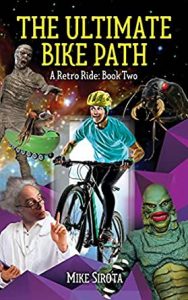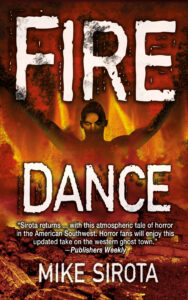I’ve learned a lot in life through trial and error, or by accident. More specifically, this can be applied to writing. We could say, in paraphrasing a familiar adage: To err is divine.

The one that started it all.
Case in point: in the ’90s, after a long run of writing and publishing sword & sorcery, sword & planet, and adventure fantasy novels, I decided to write something funny—as much to entertain myself, but in truth, with the hope of a possible book deal. Being a serious bicyclist at the time a comedy-science fiction story, Bicycling Through Space and Time, with a character named Jack Miller (me) as the eternally wisecracking protagonist, seemed a natural.
I decided to write about half a dozen chapters and see if I could sell it as part of a proposal. So Jack meets an alien named the Old Guy in downtown San Diego (he’s the only one who can see the alien) and learns that an extra gear has been “installed” on his 21-speed mountain bike, a gear that will allow Jack access to other worlds, dimensions, the past and future, literature, and so on. By the end of six chapters Jack has visited a world of giant talking sea slugs that think he’s a gross-looking life form, and another where, incapacitated, he’s dumped into a cartful of animal manure by a strange little dude who plans on taking him to a witch in order to be cured. There’s a whole lot of silliness in those first fifty or so pages.
I wondered, maybe too much? So I changed gears (no pun intended) and wrote a chapter titled, “Cowboys and Indians,” in which Jack rides back in time, winds up in 1890s Austria, and encounters Adolf Hitler as a kid. No need to recap that here; check out my post, “Writing To Vent.” It proved a gut-wrenching chapter to write, but I did it, and it got added to the other six. I sent it off to the Berkley Publishing Group and went on to other things.
Sometime later I received THE CALL. An editor from Berkley loved the concept, thought the humor was outrageous, and wanted to publish the book. She then confided in me that the emotional Hitler chapter put it over the top for her and for others to whom she was accountable. Keep up that balance, she advised me, as I forge ahead.
Well, all I could say was, WHO KNEW? I went on to write other silliness in book one, including Jack meeting a gorgeous cat-woman named Hormona the Vulvan, a journey to a world called Areelkrokka, where he encounters a Darth Vader-like baddie named Atoris the Evil, a light-enshrouded being—possibly God himself—named Ralph Ralph, and a whole lot more. But toward the end of the book Jack rides into the Rock ’n Roll Afterward, a sort of career-specific heaven, where he meets one of his (my) idols, the late Harry Chapin. I’d mentioned Jack’s (my) late dad earlier, and the effect that Harry’s song, “Cat’s in the Cradle,” has had on his (my) life, so this was a natural. Another gut-wrenching chapter to write, and even though I finished up Jack’s travels on a world with pink Pepto Bismol pools and giant mushrooms shaped like Richard Nixon’s head, the balance was there.
Berkley came through with contracts for two sequels.
 So now I did know. In the second book, The Ultimate Bike Path, I maintained that balance, including another emotional scene that took everything out of me while writing it. Jack bicycles into Doggie Afterward and meets his (my) German shepherd, Barney, who had died a while back. A solid break from goofiness such as Jack’s romp through a world of old horror and science fiction movies, his encounter with a Rastafarian rat riding in a bedpan on wheels, and so forth.
So now I did know. In the second book, The Ultimate Bike Path, I maintained that balance, including another emotional scene that took everything out of me while writing it. Jack bicycles into Doggie Afterward and meets his (my) German shepherd, Barney, who had died a while back. A solid break from goofiness such as Jack’s romp through a world of old horror and science fiction movies, his encounter with a Rastafarian rat riding in a bedpan on wheels, and so forth.
Then, humor became anger-driven satire in the third book, The 22nd Gear. I began writing the book in early 1991, about the time Operation Desert Storm, aka the Gulf War, came to a head. As wartime images flashed on the TV screen I grew angrier by the day over the insanity of war, of humans killing humans for…what? Differences in ideology, desires for more land, WHATEVER. So I had Jack bicycle into a world where, as so informed by a “killer whale/iguana thing” named Jerome, the inhabitants of four countries, by name Yodonomoho, Doyomohono, Hoyomonodo, and Nohodoyomo, fight endless bloody battles with one another. These humanoid life forms are identical in every way, save for their color. I take plenty of shots at all of this madness before having Jack put an end to it by—sadly—showing them a force of destruction far greater than anything that they possessed. After that it was back to more craziness as Jack rides to adventures with Don Quixote (see my post, “Tilting At Windmills”), visits the Hell of the Jewish Mother, and much more.
Bottom line: we all like a good laugh—or two, or ten, or twenty, so if you’re writing humor, have a ball. But remember, balancing it out with some emotion can go a long way in rounding out your character(s). And in my case, it helped sell three books.
 One final thought: this is a two-way street, so if you’re writing a serious novel—thriller, horror, whatever—don’t overlook the fact that humor is (hopefully for all of you) a natural part of our lives. Having evaluated a gazillion manuscripts I can assure you that many were deadly serious from page one till the end—and that isn’t realistic. I’m not talking a standup comedy routine, just something to occasionally lighten the somberness or intensity of your narrative.
One final thought: this is a two-way street, so if you’re writing a serious novel—thriller, horror, whatever—don’t overlook the fact that humor is (hopefully for all of you) a natural part of our lives. Having evaluated a gazillion manuscripts I can assure you that many were deadly serious from page one till the end—and that isn’t realistic. I’m not talking a standup comedy routine, just something to occasionally lighten the somberness or intensity of your narrative.
Example: there are many tense scenes in my ghost story, Fire Dance, especially in the last few chapters. At one point my two main protagonists, Tracy and Mark, have been through a series of hellish experiences and, among other things, are exhausted. But their work is not over, for the many benign spirits who have been trapped for over a century in the ruins of a desert sanitarium have freed themselves and are overrunning the retirement town of Smoke Tree and scaring the crap out of the residents. Mark and Tracy gather up the spirits and lead them back into the desert. As the ghosts follow along and the worst appears to be over, Mark looks at Tracy and grins. She wonders, “What?” His reply: “Who ya  gonna call?”
gonna call?”
Lightening it up? I hope so.

I love what you said about humor being a natural part of our lives. Even dark psychological stories should have bright spots.
PS Yeah, Rodriguez!
Yeah, I think Hannibal Lecter even got off a good one now and then. 🙂
There are occasions when it seems like humor is not a natural part of our lives, but then…if nothing else…someone comes along and makes fun of us for being so damn serious. I think that is one of the things my characters insisted on when they started saying what they wanted to say rather than what I wanted them to say. (Don’t you just love when they do that, BTW?)
As always, your advice to mix it up, whichever direction you need to go, is spot on.
I think it’s fabulous that Rodriguez is getting on any stage, even if they have to trundle him out. It must be a real mind-blower for him to be famous after all this time. But at least he managed it within his own lifetime, before it was too late. Way to go, dude!
You’re right, Kate…I sure wouldn’t want posthumous fame! 🙂